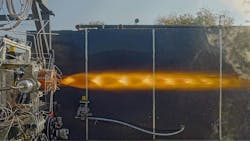Venus Aerospace to demo scalable detonation engine this summer
HOUSTON - Venus Aerospace in Houston announced the successful test of a new rocket engine component with NASA support, marking a key step in the company's development of a compact, high-performance propulsion system for hypersonic flight.
The test, conducted under a National Aeronautics and Space Administration (NASA) Small Business Innovation Research (SBIR) award, focused on evaluating new nozzle designs for Venus’s Rotating Detonation Rocket Engine (RDRE). The company says the top-performing nozzle will be integrated into a ground-based launch demonstration scheduled for later this summer.
"We've already proven our engine outperforms traditional systems on both efficiency and size," said Venus CEO Sassie Duggleby. "The technology we developed with NASA's support will now be part of our integrated engine platform—bringing us one step closer to proving that efficient, compact, and affordable hypersonic flight can be scaled."
Rotating detination
The RDRE, long seen as a promising but unproven propulsion method, generates thrust using supersonic shockwaves known as detonations, offering greater power with reduced fuel consumption. Venus says it is the first U.S. company to develop a scalable, flight-ready version of the engine.
Related: Venus Aerospace announces first ignition of its VDR2 engine
"This is just the beginning of what can be achieved with Venus propulsion technology," said Chief Technology Officer Andrew Duggleby. "We've built a compact, high-performance system that unlocks speed, range, and agility across aerospace, defense, and many other applications."
The RDRE will be central to a flight demonstration this summer to showcase detonation-based propulsion at scale. Venus previously unveiled a unified engine architecture capable of rocket-like takeoff and jet-like cruise - enabling flight from runway to Mach 5+ using a single engine system.
Design benefits
The compact design reduces cost and complexity by eliminating the need for multiple engines at different flight phases. Company officials say the system has applications ranging from hypersonic drones and missiles to satellite delivery and space cargo transport.
Venus's propulsion platform, built on proprietary intellectual property and performance data, is designed to support reusable, high-speed vehicles with broad commercial and defense utility.
